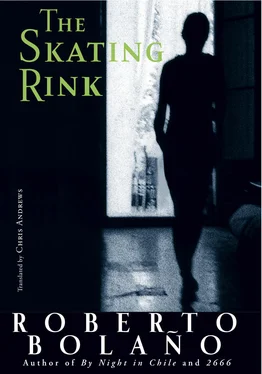Enric Rosquelles:
Benvingut emigrated at the end of the nineteenth century, so they say
Benvingut emigrated at the end of the nineteenth century, so they say, then came back after the First World War, and built his palace on the outskirts of town, at the base of the cliff, in the cove now known as Benvingut Cove. There’s a street named after him in the old part of town: Carrer Joan Benvingut. And the eminent Catalan’s memory is also honored by a bakery, a florist’s, a basketwork store and a few old, damp apartments. What did Benvingut do for Z? Well, he came back, and served as an example: he showed that a local boy could make good in the Americas. I should point out straight away that I have little time for heroes of his sort. I admire hard-working people who don’t flaunt their wealth, people who strive to modernize the land of their birth and satisfy its needs in spite of all the obstacles that seem to bar the way. But as far as I know, Benvingut was nothing like that. The barely educated son of a fisherman, he came back as Z’s Mister Big, one of the richest men in the province. Naturally he was the first to own a car. He was also the first to have a private pool and sauna. The palace was partly designed by a famous architect of the time, López i Porta, one of Gaudi’s epigones, and partly by Benvingut himself, which explains the labyrinthine, chaotic, indecisive layout of every storey in the building. And how many stories are there? Not many people know for sure. Viewed from the sea, there seem to be two, and the palace looks as if it were sinking, as if it were built on shifting sands and not on solid rock. Seeing the building from the main entrance, or from the path through the grounds, a visitor would swear there are three stories. In fact there are four. The illusion is created by the arrangement of the windows and the slope of the land. From the sea, the third and fourth stories are visible. From the entrance, the first, the second and the fourth. Oh, the pleasant afternoons I spent there with Nuria, when my plans for the Palacio Benvingut were still simply plans, still possibilities filling my spirit with the poetry and devotion that seemed, at the time, synonymous with love. Oh, the joy of wandering from room to room, opening shutters and wardrobes, discovering quiet interior courtyards and stone statues hidden by weeds! And then, at the end of the tour, when we were tired, it was so lovely to sit by the sea and polish off the sandwiches that Nuria had brought. (A can of beer for me and a bottle of mineral water for her!) Lying awake at night of late, I have often wondered what prompted me to take her to the Palacio Benvingut for the first time. As well as love — whose attempts to please generally come to grief— The Blue Lagoon is to blame. Yes, I’m referring to the film, that old movie starring Brooke Shields. To be thoroughly honest, and to indulge your curiosity, I should disclose that the whole Martí family loved The Blue Lagoon : Nuria, her mother and her sister Laia simply couldn’t get enough of Brooke and Nick’s adventures in Paradise. Have you seen The Blue Lagoon ? Even after sitting through the video five times, in the little lounge of Nuria’s apartment, I couldn’t find any cinematic merit in it. The joy it gave me initially, not the movie itself but the sight of Nuria’s profile as she watched those teenagers in the wild, was gradually replaced by anxiety and fear as we wore out the videotape. Nuria wanted to live on Brooke’s island, at least while she was watching that damned film! With her angelic beauty and her perfect, athletic body, she was ideally suited to the change of scene, and would not have suffered by comparison with Brooke. I was the one who was going to suffer, if we persisted with the extrapolation. If Nuria deserved to live on that island, she also deserved a slim, strong, handsome, not to mention young companion, like the boy in the film. The only member of the cast to whom I could claim any resemblance was, sad to say, Peter Ustinov. (Referring to Ustinov, Laia once said that he was a good fat guy although he seemed like a bad fat guy. I felt the remark was meant for me. I blushed.) How could my fatness, my charmless rotundity, bear comparison with Nick’s hard biceps? How could my lower-than-average height match the blond’s six-foot-plus stature? The mere thought was, objectively, ridiculous. Anyone else would have turned that anxiety into a joke. But I suffered as never before. Clothes and the mirror became benign or malevolent deities. I started trying to run in the mornings and do weights at the gym; I went on diets. People at work began to notice something odd about me, as if I were getting younger. I have excellent teeth! I still have all my hair! I said to myself in front of the mirror: the sort of consolation an analyst might offer. I have an impressive salary! A promising career! But I would have given it all to be with Nuria and to be like Nick. Then it struck me that the Palacio Benvingut was an island of a sort, and I took Nuria there. I took her to my island. A large part of the façade is covered with blue tiles and so are the two towers that rise from the annexes. Navy blue at the bottom and sky blue at the top of both towers. When the sun shines on them, people driving by glimpse a blue flash, a blue staircase climbing the hills. First we observed the shining palace from the car, on a bend in the road, then I invited her in. How did I come to have the keys? Simple: the palace had belonged to the Z city council for years. Nervously, I asked Nuria what she thought. She thought it was fabulous, all of it, fabulous. As pretty as Brooke Shields’ island? Much, much prettier! I thought I was going to faint. Nuria danced up and down the salon, saluted the statues and couldn’t stop laughing. We extended our tour of the building and soon discovered in the gigantic shed housing Joan Benvingut’s legendary swimming pool. Covered with filth like a tramp, the swimming pool, which had once been white, seemed to recognize and greet me. Struck dumb, unable to break the spell, I stood there while Nuria ran off through other rooms. I couldn’t breathe. The project was born, I would say, there and then, at least in essence, although I always knew I would be found out in the end. .
Remo Morán:
I met Lola in peculiar circumstances
I met Lola in peculiar circumstances, during my first winter in Z. Someone, some wicked or civic-minded soul, had been in touch with the town’s Social Services Department, and one luminous midday she turned up in front of the closed store. She could see me through the window. Like every morning, I was sitting on the floor reading, and her face on the other side of the glass looked calm and superb like a sunspot. If I’d known that she’d come in her capacity as a social worker, she probably wouldn’t have seemed so beautiful. But I only found out after getting up to open the door and telling her that the store would be closed until May. With a smile that I will never forget, she said she didn’t want to buy anything. Her visit had been prompted by a complaint. The picture, as it had been painted, was more or less like this: a boy called Alex, who wasn’t going to school; his older brother or his father (me), who seemed to have no gainful employment and just sat reading in the front of the store when the sun warmed it up — a suspicious pair of South Americans who seemed to be turning a business in the middle of the tourist district into an unfit dwelling. Whatever the reasons for making the complaint, the source of this information must have been as good as blind. I took Lola straight across to the Cartago, which was empty apart from Alex, who was running through a list of Istanbul’s bottom-end options for the hundredth time. After the introductions, we offered her a glass of cognac; then Alex got out his papers and proved that he was no longer a minor. Lola started saying that she was very sorry, people often make mistakes like that. I asked her to come back to the store, so she could see that there was nothing insalubrious about it. And while I was at it, I showed her my books, told her about my favorite Catalan poet and the Spanish poets I admired, the same old spiel. But she still couldn’t understand why we lived in the store and not in an apartment or a rooming house. That incident taught me several things: first, that South Americans are regarded with a certain degree of suspicion; second, that the Z city council doesn’t like retailers sleeping on the floor of their business premises; and third, that Alex was taking on my accent, which was disturbing. At the time Lola was twenty-two, and she was strong-willed and smart, up to a point, of course, because if she’d been really smart, she wouldn’t have gotten involved with me. She was fun, but responsible too, and she had an amazing gift for happiness. I don’t think we were too bad for each other. We got on well, we started going out, and after a few months we got married. We had a child, and when the boy was two years old, we got divorced. She introduced me to the world of adults, although I only realized that after we split up. With Lola, I was an adult, living among adults; I had adult problems and desires, and reacted like an adult; even the reasons for our separation were unambiguously adult. The aftermath was long and sometimes painful, but the upside was that it brought a degree of uncertainty back into my life, which is what I had really been missing. Did I mention that Lola’s boss was Enric Rosquelles? In the time we lived together, I got a sense of what he was like. Repulsive. A toy-size tyrant full of fears and obsessions, who thought he was the center of the world, when he was just a foul, pouting lard-ass. As it turned out, he took an instant and instinctive dislike to me. We only saw each other three times and I didn’t do anything to justify his hostility, which was, I discovered, irrational and unflagging. In his underhanded way he tried to trip me up on numerous occasions: keeping a close eye on my trading hours, checking my registration with the Tax Department, sending out the labor inspectors, but it was all in vain. What lay behind such persistent persecution? I can only suppose it was some casual observation, some tactless remark I made without thinking, which must have offended him deeply. I’m guessing that Lola was present, and the rest of the Social Services team. I vaguely remember a party, what was I doing there? I don’t know, I must have gone with Lola, which is odd, because we didn’t socialize much as a couple: she had her friends from work, including Rosquelles; and I had Alex and the deeply sad characters who drank at the Cartago. Anyhow, I probably offended him. For someone like Rosquelles, a single slightly malicious remark, barely tinged with cruelty, can be enough to nourish a lifelong grudge. But his antagonism was confined to the purely bureaucratic domain. At least until last summer. Then, incomprehensibly, he started going crazy. His behavior went over the top, and according to Lola, the staff in his department couldn’t wait to go on vacation. His prejudice against South Americans had a particular focus. Day after day, night after night, I could sense the restless presence of his shadow, the hateful fluttering of a winged pig, as if this time the trap would spring shut. It was an interesting situation, in a way, and would have rewarded closer scrutiny, but all I could think about at the time was Nuria Martí. Rosquelles was clearly disturbed and foaming at the mouth, but what was that to me? It could have been an amusing variation on the love triangle, if death hadn’t butted in. The way I see it now, all those years of minding my own business in Z were just a preparation for finding the body. .
Читать дальше












